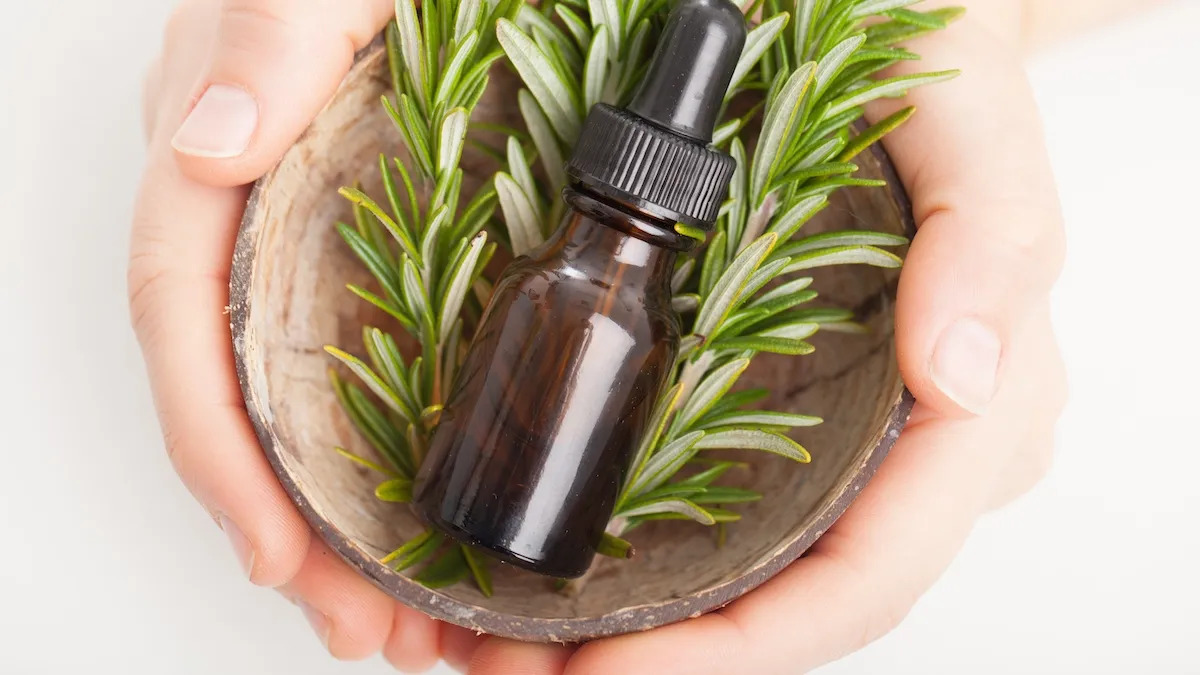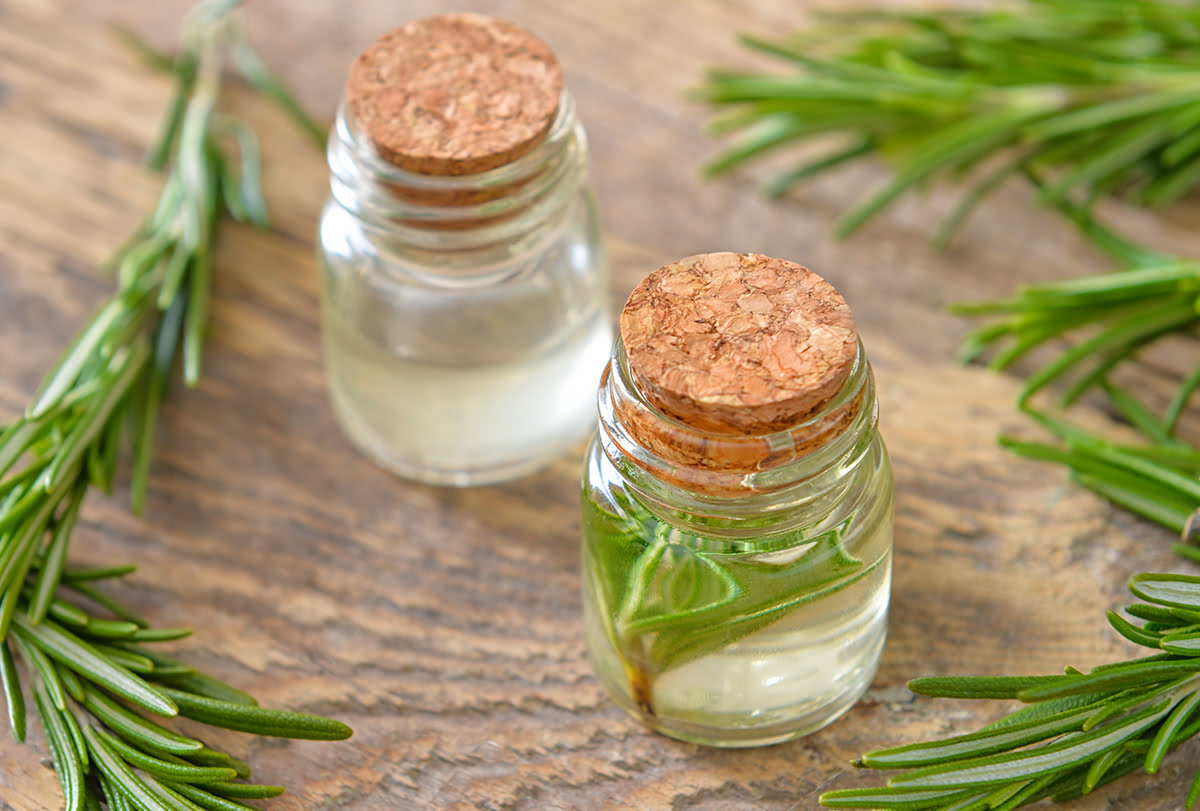Home>Gardening Techniques>DIY Projects>What Does Rosemary Oil Help With


DIY Projects
What Does Rosemary Oil Help With
Published: January 27, 2024
Discover the versatile uses of rosemary oil for your DIY projects. Explore its benefits and learn how to incorporate it into your creative endeavors. Unlock the potential of rosemary oil today!
(Many of the links in this article redirect to a specific reviewed product. Your purchase of these products through affiliate links helps to generate commission for Chicagolandgardening.com, at no extra cost. Learn more)
Table of Contents
Introduction
Introduction
Welcome to the world of essential oils, where nature's aromatic essences hold incredible potential for enhancing our well-being. Among these precious oils, rosemary oil stands out as a versatile and beneficial option for various purposes. Whether you're a dedicated aromatherapy enthusiast or simply curious about natural remedies, exploring the potential of rosemary oil can be an enlightening journey.
Rosemary oil, derived from the fragrant herb Rosmarinus officinalis, has been cherished for centuries for its remarkable properties. Its rich history includes traditional uses in folk medicine, culinary applications, and spiritual rituals. Today, rosemary oil continues to captivate individuals seeking natural solutions for health, beauty, and overall wellness.
This article aims to delve into the captivating world of rosemary oil, shedding light on its origins, benefits, uses, and precautions. By the end of this exploration, you will gain a deeper understanding of the myriad ways in which rosemary oil can enrich your life. So, let's embark on this aromatic odyssey and uncover the wonders of rosemary oil together.
What is Rosemary Oil?
Rosemary oil is a potent essential oil extracted from the leaves of the rosemary plant, scientifically known as Rosmarinus officinalis. This evergreen herb, native to the Mediterranean region, has a long history of culinary, medicinal, and ceremonial use. The process of obtaining rosemary oil involves steam distillation of the plant’s aromatic leaves, resulting in a concentrated and highly fragrant oil with a range of beneficial properties.
One of the key components of rosemary oil is 1,8-cineole, also known as eucalyptol, which contributes to its distinctive aroma and therapeutic effects. This essential oil is revered for its invigorating, herbaceous scent, which is often described as refreshing and uplifting.
From a holistic perspective, rosemary oil is renowned for its multifaceted nature, offering a blend of aromatic, medicinal, and cosmetic benefits. Its versatility extends to various applications, making it a valuable addition to aromatherapy, skincare routines, hair care products, and natural remedies.
When exploring the essence of rosemary oil, it’s essential to appreciate its rich symbolism and cultural significance. Throughout history, rosemary has been associated with remembrance, loyalty, and purification, making it a revered herb in traditions and rituals around the world.
As we unravel the depths of rosemary oil’s characteristics and potential, we gain a profound appreciation for this botanical treasure and the myriad ways it can enhance our lives.
Benefits of Rosemary Oil
Rosemary oil encompasses a diverse array of benefits that span the realms of holistic well-being, skincare, hair care, and emotional balance. Its remarkable properties make it a valuable ally in promoting overall health and enhancing daily rituals. Let’s explore the compelling advantages that rosemary oil offers:
- Enhances Cognitive Function: The invigorating aroma of rosemary oil has been linked to improved cognitive performance, including enhanced focus, memory retention, and mental clarity. Inhaling its revitalizing scent can provide a natural boost for concentration and cognitive tasks.
- Supports Hair Health: Rosemary oil is revered for its ability to promote hair growth, strengthen follicles, and improve scalp health. When incorporated into hair care routines, it can nourish the scalp, address dandruff, and contribute to lustrous, healthy-looking hair.
- Relieves Respiratory Discomfort: The camphor content in rosemary oil lends it decongestant properties, making it beneficial for alleviating respiratory issues. Inhalation of rosemary oil vapor can help clear nasal passages and provide relief from congestion and respiratory discomfort.
- Antioxidant Support: With its rich antioxidant profile, rosemary oil offers protective benefits against oxidative stress and free radical damage. This can contribute to overall cellular health and may support the body’s natural defense mechanisms.
- Mood Elevation: The uplifting fragrance of rosemary oil can have a positive impact on emotional well-being, helping to uplift the spirits, alleviate stress, and promote a sense of vitality and optimism.
These are just a few examples of the multifaceted benefits that rosemary oil brings to the table. Its holistic influence extends to various facets of our lives, making it a valuable asset in natural health and wellness practices.
Uses of Rosemary Oil
Rosemary oil’s versatility extends to a wide spectrum of practical applications, enriching daily routines and holistic practices. Its aromatic allure and potent properties make it a valuable ingredient in various contexts. Let’s explore the diverse uses of rosemary oil:
- Aromatherapy: Rosemary oil serves as a stimulating and clarifying element in aromatherapy, where it can be diffused to create an invigorating atmosphere. Its refreshing scent is conducive to promoting mental alertness and a revitalized mindset.
- Skincare: When diluted in a carrier oil, rosemary oil can be incorporated into skincare regimens to address concerns such as acne, excess oiliness, and dull complexion. Its astringent and purifying properties make it a beneficial addition to facial cleansers and toners.
- Hair Care: From scalp massages to hair serums, rosemary oil is valued for its ability to nourish the scalp, stimulate hair growth, and impart a healthy sheen to the hair. It can be blended with carrier oils or added to hair products to harness its revitalizing effects.
- Natural Cleaning: The antimicrobial and deodorizing attributes of rosemary oil make it a compelling choice for natural cleaning solutions. It can be incorporated into DIY surface sprays and air fresheners, adding a refreshing and purifying element to the home environment.
- Massage Therapy: Due to its analgesic and warming properties, rosemary oil is a popular choice for massage blends aimed at soothing muscular discomfort and promoting relaxation. When combined with a carrier oil, it can contribute to a rejuvenating massage experience.
These diverse applications showcase the adaptability of rosemary oil, allowing it to seamlessly integrate into various facets of daily life. Whether in the pursuit of wellness, beauty, or a harmonious living environment, rosemary oil offers a natural and aromatic solution.
How to Use Rosemary Oil
Integrating rosemary oil into your daily routine can be a delightful and rewarding experience, offering a range of practical and holistic benefits. Whether you’re drawn to its aromatic charm, therapeutic properties, or cosmetic advantages, there are numerous ways to incorporate rosemary oil into your lifestyle. Here are some effective methods for using rosemary oil:
- Aromatherapy Diffusion: Add a few drops of rosemary oil to an essential oil diffuser to fill your space with its refreshing aroma. This can create an uplifting ambiance, ideal for promoting mental clarity and a revitalized mood.
- Topical Application: When diluted in a carrier oil, such as jojoba or coconut oil, rosemary oil can be applied topically to the skin. This allows for targeted use in skincare routines or massage applications, harnessing its beneficial properties without causing skin irritation.
- Scalp and Hair Treatments: Incorporate rosemary oil into homemade hair masks, shampoos, or scalp treatments to nourish the hair and promote scalp health. Its stimulating effects can contribute to improved hair growth and overall hair vitality.
- Inhalation: Directly inhaling rosemary oil from the bottle or adding a few drops to a tissue can provide quick relief from congestion and respiratory discomfort. This method can also help enhance mental alertness and concentration.
- Cosmetic Blends: Blend rosemary oil with complementary essential oils and natural ingredients to create customized skincare products, such as facial serums, toners, or body oils. This allows you to tailor the benefits of rosemary oil to your specific skincare needs.
It’s important to note that when using rosemary oil topically, proper dilution is crucial to prevent skin sensitization or adverse reactions. Adhering to recommended dilution ratios and conducting a patch test can help ensure safe and enjoyable usage.
By exploring these versatile approaches, you can seamlessly integrate the aromatic allure and therapeutic prowess of rosemary oil into your daily rituals, fostering a harmonious blend of natural well-being and sensory delight.
Side Effects and Precautions
While rosemary oil offers a plethora of benefits, it’s important to be mindful of potential side effects and precautions to ensure safe and enjoyable usage. Understanding the nuances of utilizing this essential oil can help mitigate any risks and maximize its positive impact. Here are some essential considerations regarding the side effects and precautions associated with rosemary oil:
- Skin Sensitization: Undiluted or improperly diluted rosemary oil may cause skin irritation, especially for individuals with sensitive skin. It is advisable to perform a patch test before applying the oil topically and to dilute it in a suitable carrier oil to minimize the risk of adverse reactions.
- Pregnancy and Nursing: Due to its emmenagogue properties, rosemary oil is not recommended for use during pregnancy, particularly in the first and second trimesters. It is also advisable to exercise caution when using rosemary oil while nursing, as its effects on infants are not well-documented.
- Epilepsy and Seizure Disorders: Individuals with a history of epilepsy or seizure disorders should use rosemary oil with caution, as its camphor content may potentially trigger seizures in susceptible individuals. Consultation with a healthcare professional is recommended in such cases.
- Internal Use: Ingesting rosemary oil is not recommended without the supervision of a qualified healthcare practitioner. Internal use of essential oils should be approached with great caution, as improper ingestion can lead to toxicity and adverse effects.
- Children and Pets: When using rosemary oil in households with children or pets, it’s essential to practice caution and ensure proper dilution and diffusion methods. Some essential oils, including rosemary oil, can be toxic to pets and should be used sparingly and with care.
By being mindful of these considerations and respecting the potential risks associated with rosemary oil, you can cultivate a safe and enriching experience with this aromatic treasure. Prioritizing informed and conscientious usage allows you to savor the benefits of rosemary oil while safeguarding your well-being and that of your loved ones.
Conclusion
As we conclude our exploration of rosemary oil, we are left with a profound appreciation for the multifaceted virtues it embodies. From its rich historical significance to its diverse array of practical applications, rosemary oil stands as a testament to nature’s boundless potential for enhancing our lives.
Throughout history, rosemary has been revered for its symbolic resonance with remembrance, clarity, and vitality. This timeless herb has transcended cultural boundaries, leaving an indelible mark on traditions, folklore, and wellness practices worldwide. The distilled essence of rosemary in the form of essential oil encapsulates the very essence of this botanical marvel, offering a sensory journey that intertwines aromatic allure with tangible benefits.
Our journey through the world of rosemary oil has unveiled its capacity to invigorate the mind, nourish the body, and elevate the spirit. Whether diffused in the air to create an atmosphere of mental clarity, blended into skincare formulations to promote radiant complexion, or incorporated into hair care rituals to nurture healthy locks, rosemary oil weaves its aromatic charm into the fabric of our daily lives.
It’s essential to approach the usage of rosemary oil with mindfulness and respect for its potency. By embracing proper dilution, adhering to safety precautions, and honoring its historical significance, we can harness the full potential of rosemary oil while safeguarding our well-being.
As we bid adieu to this aromatic odyssey, let us carry forth a newfound reverence for the botanical treasures that enrich our existence. May the essence of rosemary oil continue to inspire moments of tranquility, rejuvenation, and sensory delight, weaving its timeless allure into the tapestry of our holistic well-being.
With a deeper understanding of rosemary oil’s virtues and a sense of kinship with nature’s aromatic wonders, we embark on a journey that celebrates the harmony between humanity and the bountiful gifts of the natural world.







